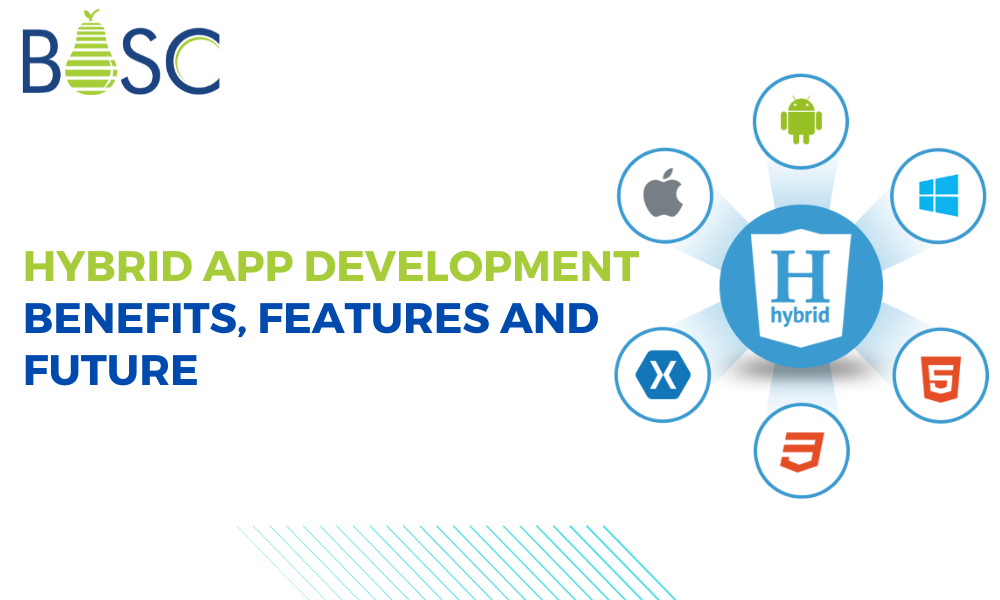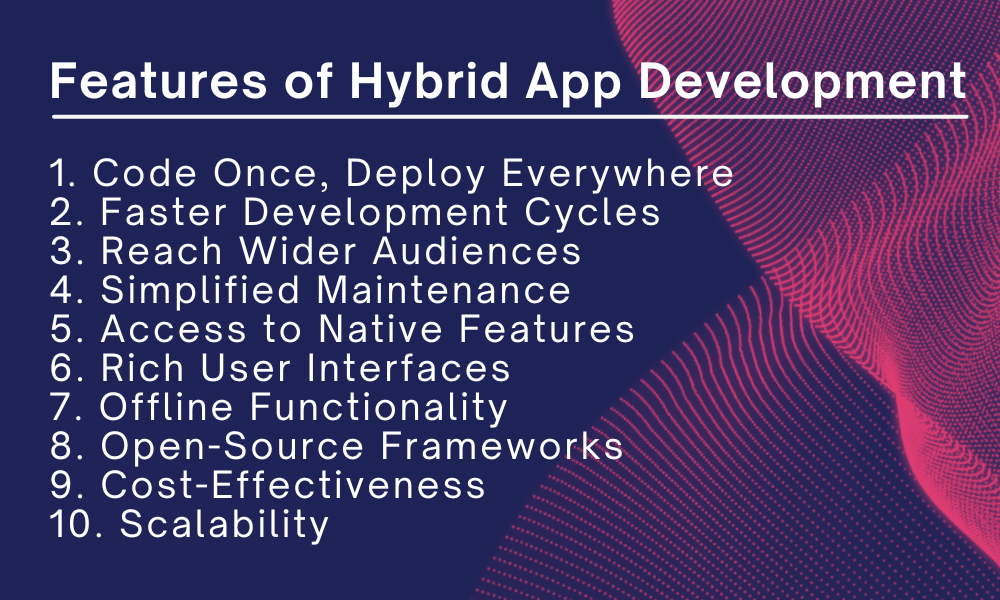
A Complete Guide: Hybrid App Development
In the technical era, businesses and developers are continuously looking for creative solutions that seamlessly combine the best characteristics of both native and web applications. A demand for a versatile and efficient methodology has given rise to hybrid app development, a process that integrates web and native development features to develop cross-platform applications. Understanding the unique aspects of hybrid app development has become essential for developers and organizations looking to maximize development resources to reach a wider audience because the demand for cross-platform compatibility is expanding. This comprehensive article covers the complexities of developing hybrid apps, including their benefits and features. Our goal is to become your go-to resource for maximizing the potential of hybrid app development, irrespective of your level of experience as a developer or business owner navigating the world of mobile application development.
Overview of Hybrid App Development
Developing mobile applications that use native mobile capabilities and web technologies (HTML, CSS, JavaScript) is known as hybrid app development. As an alternative to entirely native apps, hybrid apps combine the mobility of web development with device feature access by running inside a native container. React Native and Flutter are frameworks that simplify hybrid development by allowing developers to work more efficiently across different platforms with a single codebase. Because of its cross-platform compatibility, affordability, and quicker development cycles, it will appeal to companies who want to expand their customer base and maintain a consistent user experience across a number of operating systems and devices.
Key Features of Hybrid App Development
Hybrid app development emerges as a game-changer, offering a unique blend of native and web technologies to create cross-platform mobile applications. But what are the key features that make hybrid app development stand out?
1. Code Once, Deploy Everywhere
At the heart of hybrid apps lies the power of single codebase development. By utilizing web technologies like HTML, CSS, and JavaScript, a single codebase can be used to create apps for multiple platforms (iOS, Android, Windows), eliminating the need for separate native development efforts. This drastically reduces development time and costs, making hybrid apps attractive for startups and businesses with limited resources.
2. Faster Development Cycles
Hybrid app development leverages the speed and agility of web technologies, accelerating development cycles compared to native methods. Developers can utilize pre-built libraries and frameworks, focusing on core functionalities instead of platform-specific coding. This streamlined approach allows for quicker iterations and faster time to market, giving businesses a competitive edge.
3. Reach Wider Audiences
With a single codebase catering to multiple platforms, hybrid apps have the potential to reach a broader audience base. Businesses can tap into diverse user segments across various platforms, maximizing their reach and market penetration. This is particularly beneficial for companies targeting global audiences or expanding their market presence.
4. Simplified Maintenance
Maintaining separate native apps for different platforms can be complex and resource-intensive. Hybrid apps, with their single codebase, significantly simplify the app maintenance process. Updates and bug fixes must be implemented only once, reducing maintenance costs and ensuring consistency across all platforms.
5. Access to Native Features
While built primarily with web technologies, hybrid apps can still leverage native functionalities through plugins or APIs. This allows developers to access device-specific features like camera, GPS, and contacts, offering a more engaging and interactive user experience.
6. Rich User Interfaces
Hybrid app development frameworks provide access to many UI components and libraries, enabling developers to create visually appealing and user-friendly interfaces. This allows businesses to craft compelling user experiences that rival native apps, fostering user engagement and retention.
7. Offline Functionality
Many hybrid app frameworks offer offline capabilities, allowing users to access essential app features without an internet connection. This can be particularly beneficial for apps relying on data retrieval or functionality that requires limited connectivity.
8. Open-Source Frameworks
Various open-source frameworks like React Native, Flutter, and Ionic enrich the hybrid app development landscape. These frameworks provide developers with robust tools and resources, empowering them to build high-quality hybrid apps without significant license fees.
9. Cost-Effectiveness
Hybrid app development presents a more cost-effective alternative to building separate native apps. Reduced development time, simplified maintenance, and open-source resources contribute to lower overall costs, making hybrid apps a viable option for businesses with budget constraints.
10. Scalability
Hybrid apps offer excellent scalability, allowing businesses to quickly adapt and expand their application functionality. With a single codebase, scaling to new platforms or adding features requires minimal effort, ensuring future-proof solutions.
Top Hybrid App Frameworks
Hybrid app frameworks emerge as powerful tools, enabling developers to create efficient, cost-effective cross-platform applications. Let’s see some of the frameworks below:
1.Flutter
Flutter is Google’s open-source framework for building beautiful, high-performance applications with a single codebase. Its declarative nature and hot reload functionality enable rapid development with immediate feedback, while a rich set of built-in widgets and libraries empower developers to create stunning user interfaces. Additionally, Flutter app development gives access to native components and ensures optimal performance and a native-like user experience.
2. React Native
Facebook’s React Native enjoys widespread popularity for its familiar JavaScript and React syntax, making it ideal for developers with expertise in these languages. Hot reload functionality allows for rapid prototyping and development cycles, while the large and active community provides extensive resources, plugins, and libraries to accelerate React mobile app development. Additionally, React Native’s ability to leverage native components delivers a smooth user experience that rivals native apps.
3. Ionic
For web developers seeking a seamless transition to hybrid app development, Ionic offers an attractive option. This web-based framework utilizes familiar web technologies like HTML, CSS, and JavaScript, enabling developers to leverage their existing skills. Pre-built components and UI elements further streamline development, while the wide range of available plugins caters to diverse project needs. However, Ionic may not be optimal for performance-critical scenarios compared to some of its counterparts.
4. NativeScript
If you prioritize native performance and access to extensive native features, NativeScript is a compelling option. This framework allows developers to build applications with native APIs, resulting in optimal performance and responsiveness. Furthermore, NativeScript supports multiple languages, including JavaScript, TypeScript, and Angular, offering flexibility for developers with different programming backgrounds.
Know About: Why Hybrid Mobile Apps Could Be a Good Idea for Your Business in 2023?
5. Xamarin
For enterprise-level projects requiring high performance, security, and full access to native features, Xamarin emerges as a strong contender. This Microsoft-backed framework utilizes C# for development, offering a familiar environment for developers with C# expertise. Xamarin provides access to all native functionalities, ensuring optimal performance and capabilities. However, commercial licensing and a steeper learning curve due to the need for native development and Xamarin framework knowledge make it less suitable for individual developers or smaller projects.
Future of Hybrid App Development
As technology continues to evolve and user expectations grow, the future of hybrid app development holds immense promise.
1. Technological Advancements: Frameworks like React Native and Flutter are constantly improving, offering better performance, access to native features, and ease of development. These advancements are bridging the gap between native and hybrid app performance, making hybrid apps a more viable option for complex applications.
2. Expanding Ecosystem: The hybrid app development ecosystem is growing, with more frameworks, tools, and libraries becoming available. This gives developers greater flexibility and resource access, further simplifying development processes.
3. Rise of Low-Code/No-Code Platforms: Appian and Mendix are making app development more accessible to businesses with limited technical expertise. These platforms often leverage hybrid app technologies, allowing even non-programmers to create essential apps for various needs.
4. Shifting User Preferences: Users are increasingly platform-agnostic, expecting consistent experiences across their devices. This trend favors cross-platform development approaches like hybrid app development, which can deliver similar user experiences across iOS, Android, and other platforms.
Conclusion
Hybrid app development is a dynamic solution that merges the power of native and web applications. Code reusability, faster development cycles, and access to native functionalities give a business cost-effective and scalable mobile solutions. Top frameworks such as Flutter, React Native, and Ionic provide developers with robust tools, while the future promises continual advancements and an expanding ecosystem. If you want to grow your business in this competitive market, partnering with a leading mobile app development company in the USA is a great idea. Thus, their experts will give tailored solutions using hybrid app technologies for optimal results.
